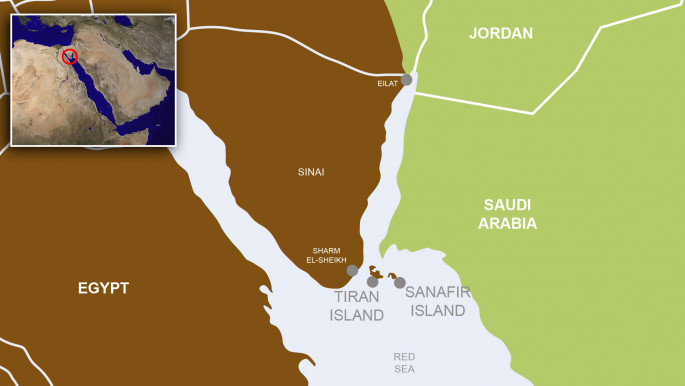No-islands, no-deal: Saudi Arabia sets conditions for forgiving Egypt
Saudi Arabia will not mend ties with Egypt until Foreign Minister Sameh Shukri is sacked and two contested Red Sea islands are transferred to Saudi sovereignty, a source close to the Saudi ambassador in Cairo told The New Arab's sister publication.
This comes as strained relations between Egypt and Saudi Arabia show no signs of improving.
"The crisis between the two countries is too complicated to be resolved with a meeting if one were to take place between President Abdel Fattah al-Sisi and King Salman bin Abdulaziz on the sidelines of the UAE National Day," the source said.
That meeting did not materialise. Shortly before the Saudi king arrived in the UAE on the first leg of his Gulf tour that will take him next to Qatar, Bahrain and Kuwait, Sisi left Abu Dhabi.
"There is a total Saudi rejection of any detente with the Egyptian administration, led by the Deputy Crown Prince Mohammed bin Salman," the source added.
"Bin Salman demanded the islands agreement be implemented first before taking any move to correct relations between the two countries," continued the source.
"The young prince wanted to present himself in a certain way to Saudi society after securing the islands... [and] to take advantage of this to increase his popularity.”
 |
The Egyptian regime had deliberately tricked the Saudi king |  |
Bin Salman allegedly made another condition for detente was the dismissal of Egyptian Foreign Minister Sameh Shukri "given his anti-Saudi positions", the source claimed without elaborating further.
The thinking in Riyadh is that the Egyptian regime had deliberately tricked Saudi King Salman with the Tiran and Sanafir affair - two Red Sea islands Sisi agreed to hand over to Saudi Arabia during the monarch's visit to Cairo in early April. Salman signed a number of agreements during this visit, including the ceding of the islands to Riyadh in return for Saudi aid.
The Saudi aid package allegedly included oil deliveries, direct investment, and deposits in the central bank to shore up Egypt's depleted currency reserves.
But Egypt froze the islands' handover process following angry protests and legal action taken by Egyptian oppositionists that led to a court order halting the agreement. The government has since appealed the order.
| Read more: The Saudi Egyptian divide runs deeper than Syria |
These developments were likely one of the reasons behind Saudi Arabia's decision to suspend oil deliveries via Aramco, which is dominated by the deputy crown prince, said the source.
He claimed the decision predated Egypt's decision to vote in favour of a Russian resolution on Syria at the UN Security Council.
At the time, the vote angered Saudi Arabia and further strained relations between the two countries.
After that, unspecified "leading Arab figures" tried to mediate between the two governments, but the attempts were stonewalled by the Saudi prince, the source claimed.
 |
The Saudi rebuffs seem to have angered the Egyptian regime |  |
Semi-official backlash
The Saudi rebuffs seem to have angered the Egyptian regime.
"Egypt must not bow down to dictates by other Arab governments for the sake of aid," wrote Ibn al-Dawla ["Son of the State"] in his column this week in government-affiliated al-Yawm al-Sabei.
"Son of the State" is likely to be Lt. Ahmed Shaaban, General Abbas Kamel's chief of staff, a key figure in the Egyptian presidency.
The writer is thought to be the key figure behind the regime's media nexus, and wrote in what is probably a quasi-official reaction from the government.
"Egypt's positions are based on its vision, interests, national security and regional security. This position does not tolerate extortion. Current outcomes vindicate Egypt's attitude and vision in Syria and Libya," he wrote, in reference to the regime's support for Syria's Bashar al-Assad and controversial Libyan militia leader Khalifa Haftar.
"Egypt cannot trade its sovereignty for aid or loans… or change its positions under pressure. At the same time, Egypt is keen to have relations with all Arab countries and does not attempt to impose its views."





 Follow the Middle East's top stories in English at The New Arab on Google News
Follow the Middle East's top stories in English at The New Arab on Google News


